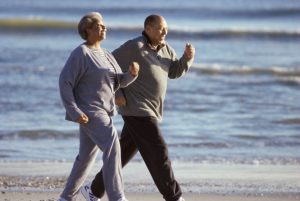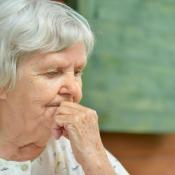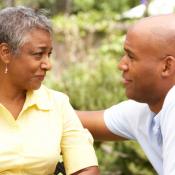 Exercise and group activities can reduce depression symptoms and provide support to people facing a dementia diagnosis, according to two new studies.
Exercise and group activities can reduce depression symptoms and provide support to people facing a dementia diagnosis, according to two new studies.
One study, a dissertation from Umeå University, found people with dementia who participated in either group exercise or another group activity had a reduction in symptoms of depression. A second study, published in Dementia: The International Journal of Social Research and Practice, found community-based support groups could empower people who had received an early diagnosis of dementia. According to the Alzheimer’s Association, 1 in 3 seniors dies with Alzheimer’s or another dementia.
Exercise and Group Activities for Dementia
To explore the benefits of exercise and group activities, doctoral student Gustaf Boström compared the effects of 45 minutes of functional exercise to those of seated group activities. Seniors participating in the exercise program performed balance and leg-strengthening activities every other weekday for four months. Seniors in the group activity sat while singing, listening to readings, or talking for 45 minutes every other weekday.
There were no differences in outcome between the two groups, though both experienced a reduction in symptoms of depression. Boström says depression is common among people with dementia. Antidepressants sometimes fail to work in this group, and their side effects can exacerbate other health issues. His research suggests recurring activities, whether exercise-based or not, might be a valid antidepressant substitute.
The Role of Community Support Groups
An unrelated study explored the role of social support in people with dementia. Researchers looked at the effects of day treatment programs for people with dementia. These programs keep seniors active, while giving family members a break from caregiving duties.
One program, Paul’s Club, offers social and recreational activities three days a week. Participants engage in a range of activities, including physical exercise, group outings, and lunch. The group always walks together, providing both physical activity and a predictable routine. The study’s authors suggest this program connects members to the community, establishing a sense of belonging. Participants in programs like Paul’s Club may be able to continue living at home longer than peers who do not participate in such programs.
Taken together, both studies point to the value of ongoing physical and social activities for seniors with dementia.
References:
- Group activities reduced depressive symptoms among older people with dementia. (2016, May 3). Retrieved from http://www.eurekalert.org/pub_releases/2016-05/uu-gar050316.php
- Latest Alzheimer’s facts and figures. (2013, September 17). Retrieved from http://www.alz.org/facts/
- Phinney, A., Kellen, E. E., Baumbusch, J., O’Connor, D., & Purves, B. (2016). Walking in the neighbourhood: Performing social citizenship in dementia. Dementia: The International Journal of Social Research and Practice. Retrieved from https://open.library.ubc.ca/cIRcle/collections/facultyresearchandpublications/52383/items/1.0300370
- Social clubs fill gap in dementia support. (2016, May 3). Retrieved from http://www.eurekalert.org/pub_releases/2016-05/uobc-scf050216.php

The preceding article was solely written by the author named above. Any views and opinions expressed are not necessarily shared by GoodTherapy.org. Questions or concerns about the preceding article can be directed to the author or posted as a comment below.

 At a Loss: The Day-to-Day Toll of Dealing with Dementia
At a Loss: The Day-to-Day Toll of Dealing with Dementia How to Help an Aging Parent with Depression
How to Help an Aging Parent with Depression Dealing with Depression: Why ‘Get Over It’ Doesn’t Work
Dealing with Depression: Why ‘Get Over It’ Doesn’t Work

